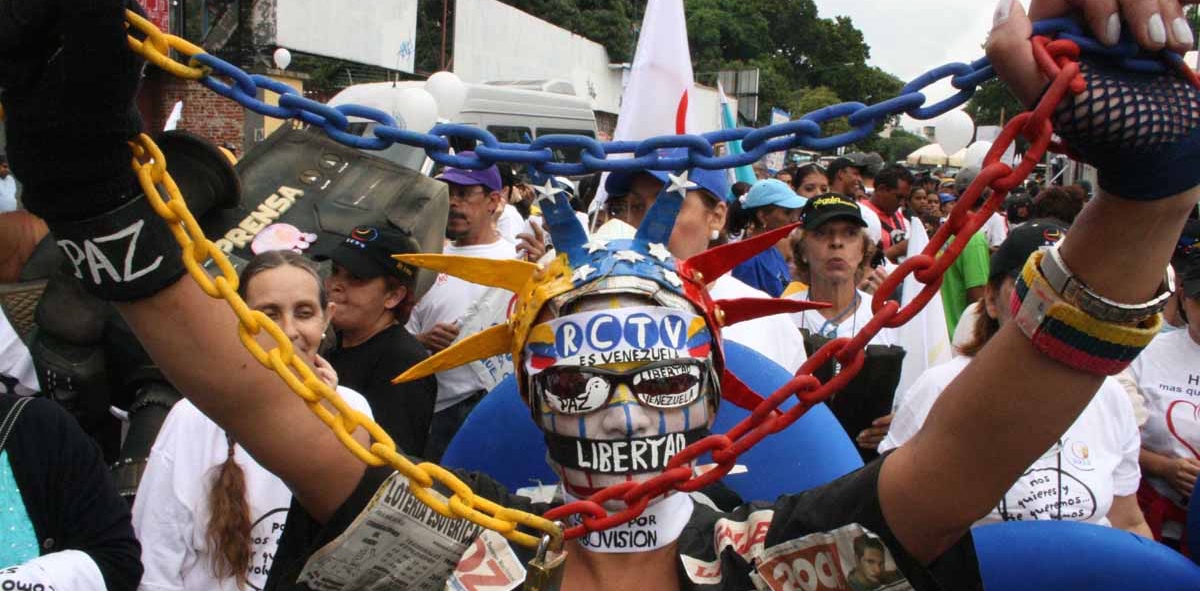
EspañolRadio Caracas Televisión may not have seen its last days after all.
On Monday, September 7, the Inter-American Court of Human Rights (IACHR) issued a ruling ordering the Venezuela government to restore the network’s broadcasting license and return all seized assets.
Radio Caracas Televisión (RCTV), which the Hugo Chávez administration shut down in 2007, praised the court’s decision in a statement on Tuesday.
“This is a big victory for Venezuela. An opportunity for Venezuelans to enjoy their right to be informed,” RCTV President Marcel Garnier said. “The government will also have to return the equipment they stole from us.”
The IACHR contends that the Venezuelan government has violated RCTV’s right to free speech by keeping the network off the air for eight years, and replacing it with the state-run Televisora Venezolana Social (TVES).
President Nicolás Maduro has so far remained silent on the issue, but Venezuela’s Supreme Court ruled on Thursday, September 10, that IACHR’s order was “unenforceable.”
The Venezuelan court argues the company’s rights have not been violated, and says the IACHR ruling overlooks the Venezuelan government’s constitutional authority to grant and withdraw broadcast licenses.
Venezuela abandoned the regional court in 2013 following the government’s denunciation of the American Convention on Human Rights. The court, however, maintains its jurisdiction over cases which occurred before Venezuela’s exit.
RCTV’s final broadcast aired on May 27, 2007, before the Hugo Chávez administration (1999-2013) decided not to renew the network’s license. The shut down affected more than 7,000 employees.
The network was known for its critical stance on the Chávez administration, and was among the first media outlets to denounce the concentration of power in the hands of the president. Chávez announced RCTV’s closure on national television and claimed the network had conspired in a coup d’etat against his government.
The company has since waged legal battles at various levels of the Venezuelan judiciary, and has had its petition to recover expropriated assets rejected three times by the Supreme Court.
Shortly after the closure, Chávez handed RCTV’s license and equipment over to state-run TVES. The Supreme Court ruled that the government could expropriate the equipment, without compensation, in order to “ensure that the state can immediately operate the television channel.”
[adrotate group=”8″]
In 2014, the Inter-American Press Association (IAPA) asked the IACHR to rule against the Venezuelan government over the “the unlawful shutdown of RCTV.”
The IAPA denounced the government’s retaliation against RCTV “for its editorial stance,” calling it “a flagrant violation of the principles of freedom of expression established in the American Convention.”
Flagship Case for Property-Rights Violations
Andrea Rondón, head of the Property Rights Committee at CEDICE Libertad and academic director for the Mises Institute Venezuela, told the PanAm Post that the IACHR ruling acknowledges Venezuela’s lack of free speech and independent judiciary.
Rondón stressed that the Venezuelan government made an example out of RCTV to push the rest of the media to change their editorial line and “adapt it to government requirements.”
She says that the IACHR ruling also notes that the Venezuelan government did not follow the proper procedure for nationalizing a company. However, Rondón believes the international court’s ruling “falls short,” because it does not address the property-rights violations involved in this case.
According to the expert, the IACHR’s ruling is binding and the Venezuelan government must comply. If it does not, she says, it “won’t be just another case of contempt of court … it will be more evidence that we live in a dictatorship.”
 Versión Español
Versión Español












